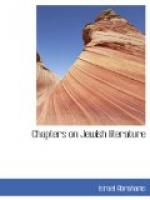Hence, doubting heart!
I will the Lord extol
With gladness,
for in him is my desire,
Which, as with fatness, satisfies
my soul,
That doth to heaven
aspire.
All that is hidden shall mine
eyes behold,
And the great
Lord of all be known to me,
Him will I serve, his am I
as of old;
I ask not to be
free.
Sweet is ev’n sorrow
coming in his name,
Nor will I seek
its purpose to explore,
His praise will I continually
proclaim,
And bless him
evermore.
Ibn Ezra wandered over many lands, and even visited London, where he stayed in 1158. Ibn Ezra was famed, not only for his poetry, but also for his brilliant wit and many-sided learning. As a mathematician, as a poet, as an expounder of Scriptures, he won a high place in Jewish annals. In his commentaries he rejected the current digressive and allegorical methods, and steered a middle course between free research on the one hand, and blind adherence to tradition on the other. Ibn Ezra was the first to maintain that the Book of Isaiah contains the work of two prophets—a view now almost universal. He never for a moment doubted, however, that the Bible was in every part inspired and in every part the word of God. But he was also the father of the “Higher Criticism.” Ibn Ezra’s pioneer work in spreading scientific methods of study in France was shared by Joseph Kimchi, who settled in Narbonne in the middle of the twelfth century. His sons, Moses and David, were afterwards famous as grammarians and interpreters of the Scriptures. David Kimchi (1160-1235) by his lucidity and thoroughness established for his grammar, “Perfection” (Michlol), and his dictionary, “Book of Roots,” complete supremacy in the field of exegesis. He was the favorite authority of the Christian students of Hebrew at the time of the Reformation, and the English Authorized Version of 1611 owed much to him.
At this point, however, we must retrace our steps, and cast a glance at Hebrew literature in France at a period earlier than the era of Ibn Ezra.
BIBLIOGRAPHY
TRANSLATIONS OF SPANISH-HEBREW POEMS:
Emma Lazarus.—Poems (Boston, 1889).
Mrs. H. Lucas.—The Jewish Year (New
York, 1898), and in
Editions of the Prayer-Books. See
also (Abrahams) J.Q.R.,
XI, p. 64.
IBN GEBIROL.
Graetz.—III, 9.
D. Rosin.—The Ethics of Solomon Ibn
Gebirol, 7. J.Q.R.,
III, p. 159.
MOSES IBN EZRA.
Graetz.—III, p. 319 [326].
ABRAHAM IBN EZRA.
Graetz.—III, p. 366 [375].
Abraham Ibn Ezra’s Commentary on Isaiah (tr. by M. Friedlaender, 1873).
M. Friedlaender.—Essays on Ibn Ezra
(London, 1877). See also
Transactions of the Jewish Historical
Society of England,
Vol. II, p. 47, and J. Jacobs, Jews
of Angevin England,
p. 29 seq.




